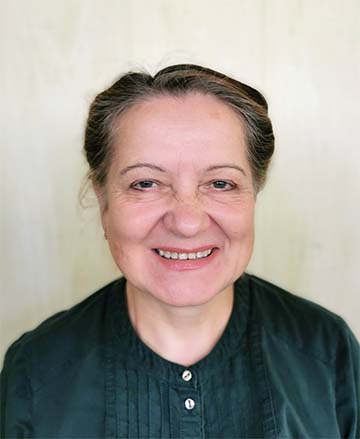
Irina G. Palchikova
In this installment of Senior Member Insights, OPN talks with Irina G. Palchikova, a doctor of science, a professor of physics at Novosibirsk State University (NSU), Russia, and the head of the laboratory at the Technological Design Institute of Scientific Instrument Engineering of the Siberian Branch of the Russian Academy of Sciences. Palchikova’s research interests include biophotonics, computer vision and microscopy, namely computer image cytometry. Her research activity has been mainly devoted to the numerical and experimental study of optical diffraction, diffractive optical elements and their applications.
What first interested you in pursuing science?
I was born, educated, live and work in Novosibirsk, the third city of Russia and the first city of Siberia. Since childhood, I have always sought to do something, namely, do what I can, study what I can, improve solutions (common, technical or social) and transmit them further. It was this desire that led me to study science.
What aspect of your current work do you find the most interesting or exciting?
The current work of my laboratory is focused on the problems of using computer vision in biomedical research—for example, assessing the viability of endothelial epithelial cells of the preserved cornea. Collaboration with scientists in other specialties makes it possible to discover new possibilities for the application of classical optics solutions, on the one hand, and to reveal unobvious features of the functioning of living systems, on the other hand.
What tips for successful networking do you have for early-career professionals?
Do not be afraid or avoid discussing the results of the scientific work of any authors in the circle of professionals. Personal meetings at conferences are the best way to get acquainted with other scientists, find associates in work, find out the results of research at various universities and find the best ways to solve their own problems. Networking resources such as LinkedIn and ResearchGate can also be useful for the research community.
How important are leadership roles in career development and how do you hone your leadership skills?
Leadership roles in career growth and research are not coincidental concepts but often even interfere with each other. To obtain outstanding research results, the most important thing is the presence of a coherent team. And for personal career growth, leadership from an experienced specialist scientist is of great importance. A person’s success in a leadership position is often determined not by their leadership qualities but by external circumstances, such as the type of work financing or the presence of economic knowledge or connections with employers. Leadership qualities for research leadership are best worked out in teaching or the academic advising of students.
What’s the best career decision you’ve ever made, and why?
For five years, I served as deputy dean of the Faculty of Physics of NSU, where approximately 1,000 teachers work and approximately 600 students study. I gained experience in communicating with many outstanding professors and experience in harmonizing requirements for conducting scientific works and the bureaucratic requirements of the ministry. And my best decision was to leave this bureaucratic work and completely return to scientific research. This decision allowed me to develop my career at the Research Institute.
What skills do you think are most important for someone interested in a career like yours?
Firstly, internal motivation is needed. Secondly, a good university education is needed in a chosen specialty. Thirdly, it is impossible to do without communication skills: the ability, on the one hand, to get along with people, and on the other, to defend your opinion and find the right solution for the tasks at hand.
What is one piece of advice that you wish you were given as a student/early in your career?
Considering the results of scientific work, your life situation, or political accents, do not forget to ask this question more often: Is this so? Is that really true?
What have you learned by being a mentor to others, and what have you learned from mentors who helped shepherd your career?
A good mentor seeks to make students better professionals than they are. However, students usually do not suspect this. My students, for my anniversary, made a long poetic congratulation, which ended as follows: “You brought us on a dish already-chewed-up granite of science. All this heart will not forget, but the head will not remember...”
At this point in your career, what are you most looking forward to next?
I look forward to the speedy end of the deadly COVID harvest.
